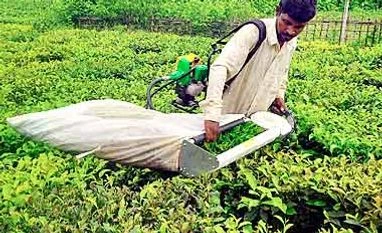Indian tea exporters to the UK like McLeod Russel and Goodricke have converted at least 50 per cent of their trade to the dollar, yet an immediate impact of 7-8 per cent on price realisation is likely.
“The trade in pounds will take an immediate hit,” said AN Singh, managing director and chief executive of the Goodricke Group. The group exports 100,000 kg of tea annually to the UK.
Also Read
The Indian Tea Association said the forex implications would be temporary and contracts between British buyers and Indian tea sellers would not be affected. The ones coming up for renewal would see a rise in prices, it added.
| Indian tea exports to UK | |||||
| Financial Year | Quantity exported (mn kg) | Value (Rs cr) | Value (mn USD) | Unit Price (Rs/kg) | Unit Price ($/kg) |
| 2016-17 (until April) | 0.48 | 7.64 | 1.15 | 159.17 | 2.40 |
| 2015-16 | 20.02 | 410.90 | 62.80 | 205.24 | 3.14 |
| 2014-15 | 17.83 | 338.32 | 55.35 | 189.75 | 3.10 |
| 2013-14 | 17.64 | 338.13 | 55.98 | 191.68 | 3.17 |
| 2012-13 | 19.21 | 347.91 | 63.91 | 181.11 | 3.33 |
| Source: Tea Board of India | |||||
Azam Monem, vice-president of The Indian Tea Association, said tea prices could surge in Britain but it would not reflect in Indian exporters’ balance sheets because of the currency volatility.
The trade with Germany, which buys tea from India and exports to the UK after blending, would need to be monitored, Monem said. If the Europe Union (EU) continued its trade with the UK on existing terms, Indian tea exports to Germany would remain buoyant, he added.
Tea producers in the Assam Valley and Darjeeling are confident that exports to the UK will remain stable.
“The demand for Darjeeling tea will remain stable despite Brexit. People are accustomed to its taste and price fluctuations will not disrupt trade,” said Sheo Shankar Bagaria, president of the Darjeeling Tea Association.
Of the 20.02 million kg of tea exported to the UK in 2015-16, Assam CTC comprised 90 per cent by volume and Darjeeling and Assam Orthodox tea variants made up five per cent each. The development in the UK coincides with a pricey second flush being harvested in India.
You’ve hit your limit of {{free_limit}} free articles this month.
Subscribe now for unlimited access.
Already subscribed? Log in
Subscribe to read the full story →

Smart Quarterly
₹900
3 Months
₹300/Month
Smart Essential
₹2,700
1 Year
₹225/Month
Super Saver
₹3,900
2 Years
₹162/Month
Renews automatically, cancel anytime
Here’s what’s included in our digital subscription plans
Access to Exclusive Premium Stories Online
Over 30 behind the paywall stories daily, handpicked by our editors for subscribers


Complimentary Access to The New York Times
News, Games, Cooking, Audio, Wirecutter & The Athletic
Business Standard Epaper
Digital replica of our daily newspaper — with options to read, save, and share


Curated Newsletters
Insights on markets, finance, politics, tech, and more delivered to your inbox
Market Analysis & Investment Insights
In-depth market analysis & insights with access to The Smart Investor


Archives
Repository of articles and publications dating back to 1997
Ad-free Reading
Uninterrupted reading experience with no advertisements


Seamless Access Across All Devices
Access Business Standard across devices — mobile, tablet, or PC, via web or app



)
